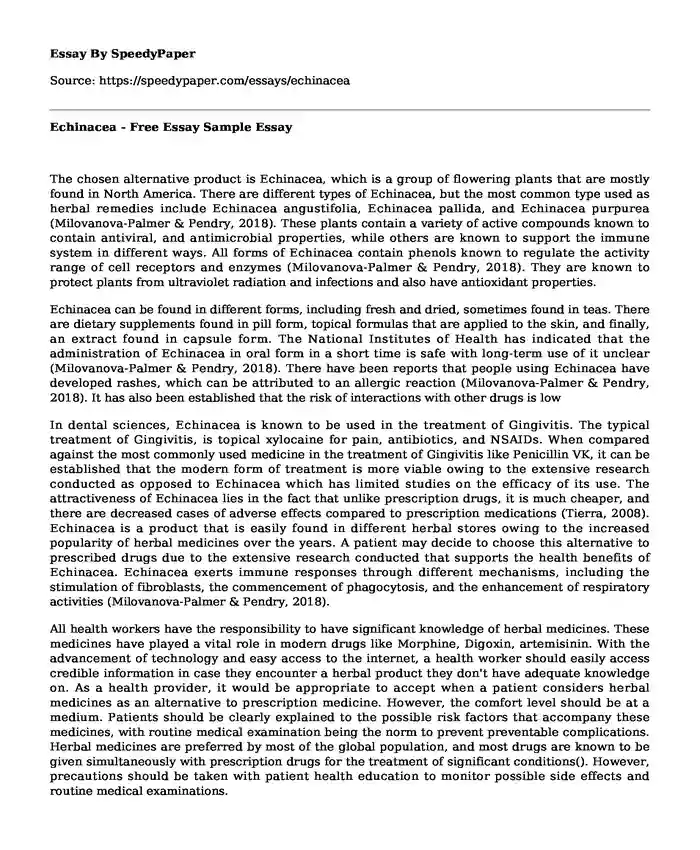
| Type of paper: | Essay |
| Categories: | Biology Medicine Healthcare Drug |
| Pages: | 3 |
| Wordcount: | 620 words |
The chosen alternative product is Echinacea, which is a group of flowering plants that are mostly found in North America. There are different types of Echinacea, but the most common type used as herbal remedies include Echinacea angustifolia, Echinacea pallida, and Echinacea purpurea (Milovanova-Palmer & Pendry, 2018). These plants contain a variety of active compounds known to contain antiviral, and antimicrobial properties, while others are known to support the immune system in different ways. All forms of Echinacea contain phenols known to regulate the activity range of cell receptors and enzymes (Milovanova-Palmer & Pendry, 2018). They are known to protect plants from ultraviolet radiation and infections and also have antioxidant properties.
Echinacea can be found in different forms, including fresh and dried, sometimes found in teas. There are dietary supplements found in pill form, topical formulas that are applied to the skin, and finally, an extract found in capsule form. The National Institutes of Health has indicated that the administration of Echinacea in oral form in a short time is safe with long-term use of it unclear (Milovanova-Palmer & Pendry, 2018). There have been reports that people using Echinacea have developed rashes, which can be attributed to an allergic reaction (Milovanova-Palmer & Pendry, 2018). It has also been established that the risk of interactions with other drugs is low
In dental sciences, Echinacea is known to be used in the treatment of Gingivitis. The typical treatment of Gingivitis, is topical xylocaine for pain, antibiotics, and NSAIDs. When compared against the most commonly used medicine in the treatment of Gingivitis like Penicillin VK, it can be established that the modern form of treatment is more viable owing to the extensive research conducted as opposed to Echinacea which has limited studies on the efficacy of its use. The attractiveness of Echinacea lies in the fact that unlike prescription drugs, it is much cheaper, and there are decreased cases of adverse effects compared to prescription medications (Tierra, 2008). Echinacea is a product that is easily found in different herbal stores owing to the increased popularity of herbal medicines over the years. A patient may decide to choose this alternative to prescribed drugs due to the extensive research conducted that supports the health benefits of Echinacea. Echinacea exerts immune responses through different mechanisms, including the stimulation of fibroblasts, the commencement of phagocytosis, and the enhancement of respiratory activities (Milovanova-Palmer & Pendry, 2018).
All health workers have the responsibility to have significant knowledge of herbal medicines. These medicines have played a vital role in modern drugs like Morphine, Digoxin, artemisinin. With the advancement of technology and easy access to the internet, a health worker should easily access credible information in case they encounter a herbal product they don't have adequate knowledge on. As a health provider, it would be appropriate to accept when a patient considers herbal medicines as an alternative to prescription medicine. However, the comfort level should be at a medium. Patients should be clearly explained to the possible risk factors that accompany these medicines, with routine medical examination being the norm to prevent preventable complications. Herbal medicines are preferred by most of the global population, and most drugs are known to be given simultaneously with prescription drugs for the treatment of significant conditions(). However, precautions should be taken with patient health education to monitor possible side effects and routine medical examinations.
References
Kahraman, C., Arituluk, Z. C. & Cankaya, I. I. T. (2020). The Clinical Importance of Herb-Drug Interactions and Toxicological Risks of Plants and Herbal Products. In Medical Toxicology. IntechOpen.
Milovanova-Palmer, J., & Pendry, B. (2018). Is there a role for herbal medicine in the treatment and management of periodontal disease? Journal of Herbal Medicine, 12, 33-48.
Tierra, M. (2008). Echinacea: an effective alternative to antibiotics. Journal of herbal pharmacotherapy, 7(2), 79-89.
Cite this page
Echinacea - Free Essay Sample. (2023, Sep 10). Retrieved from https://speedypaper.com/essays/echinacea
Request Removal
If you are the original author of this essay and no longer wish to have it published on the SpeedyPaper website, please click below to request its removal:
- Essay Sample on Teaching Plan and Presentation for Acquired Pneumonia
- Nursing Essay Sample: The Quality Improvement Journey
- Free Essay on How to Make Electricity
- Cultural Anthropology Essay Sample: The Ceremony of the Award of Certification
- Cochrane - Article Review Essay Example
- Essay Example. Strategic Corporate Communication - Healthcare
- How My Employer Is Responding to My Project? Paper Example
Popular categories




